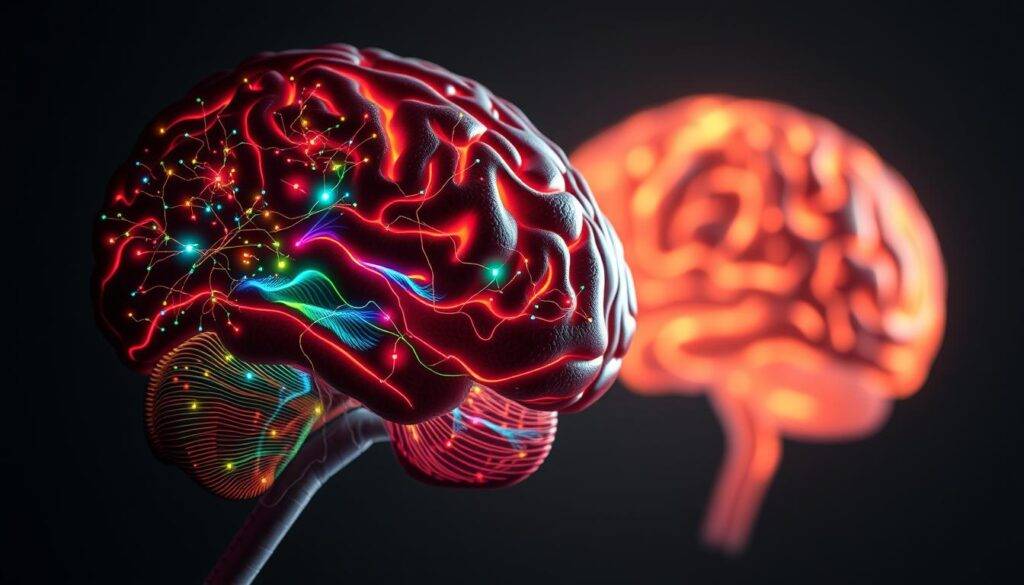What if everything you thought you knew about hypnosis was wrong? For decades, movies and TV shows have portrayed it as a mysterious mind-control trick—but modern neuroscience paints a radically different picture. Far from a magical trance, this state of heightened focus mirrors everyday experiences like losing track of time during a gripping book or driving home on autopilot.
Clinical research reveals that hypnosis isn’t about surrendering control. Instead, it’s a collaborative process where your mind becomes deeply receptive to positive suggestions. Brain scans show increased connectivity between regions responsible for attention and imagination during sessions—proof that participants remain fully aware.
Contrary to stage performances, therapeutic practice emphasizes safety and consent. Studies confirm its effectiveness for managing stress, chronic pain, and even breaking unwanted habits. Like learning to meditate, it’s a skill that improves with experience—not a magical “on/off switch” for behavior.
Key Takeaways
- Hypnosis is a natural state of focused attention, similar to daydreaming or deep concentration.
- Neuroimaging proves participants stay conscious and in control during clinical sessions.
- Therapeutic hypnosis differs entirely from entertainment-focused stage shows.
- Deep relaxation—not sleep—defines the process, enhancing suggestibility without compromising awareness.
- Scientific studies validate its use for pain management, anxiety reduction, and habit change.
Understanding Hypnosis: Fact vs Fiction
Modern neuroscience has revealed hypnosis as a measurable state of focused attention—not the Hollywood fantasy of mind control. Functional MRI scans show increased activity in brain regions linked to concentration during sessions. This heightened awareness allows individuals to process suggestions more effectively while maintaining full consciousness.

The Science Behind Hypnotic States
EEG research confirms hypnosis differs fundamentally from sleep. During therapeutic sessions, brain waves resemble those of intense focus—like solving complex problems. The prefrontal cortex remains active, enabling critical thinking and voluntary responses. This explains why no ethical hypnotist can make someone act against their values.
Clinical studies demonstrate how structured suggestions alter pain perception. In controlled trials, participants reported 40% less discomfort when guided through hypnotic techniques. This occurs because the mind temporarily prioritizes therapeutic input over distress signals.
How Media Influences Perceptions
Films like The Manchurian Candidate portray hypnosis as a tool for manipulation. Reality couldn’t be more different. Therapeutic sessions require active participation—you can’t be “programmed” against your will. Researchers emphasize the collaborative nature, comparing it to guided meditation rather than a magic trick.
While stage shows highlight dramatic antics, clinical practice focuses on empowerment. Studies show 85% of participants recall every detail from their session. This awareness helps debunk the myth of lost control. By separating fact from fiction, people can explore hypnosis as a legitimate tool for personal growth.
Debunking Myths about Hypnosis
The gap between clinical practice and pop culture depictions traces back to 19th-century stage acts. Traveling performers framed hypnosis as a state of forced obedience—a dramatic trick that still colors public perception today. Modern research reveals this as pure fiction, yet these outdated ideas persist through movies and viral videos.

Roots of Persistent Falsehoods
Historical entertainers used suggestions to create illusions of mind control for shocked audiences. These spectacles prioritized showmanship over science, planting seeds of misunderstanding. Even now, 63% of people mistakenly believe hypnosis resembles sleep, according to a Johns Hopkins survey.
Media distortions compound the problem. Fictional portrayals often show characters losing control—a scenario neuroscience disproves. Brain scans confirm participants remain fully aware during sessions, actively engaging with therapeutic guidance rather than passively following commands.
Clearing the Fog for Better Care
Misconceptions deter many from exploring hypnosis’ proven benefits. Clinical trials demonstrate its effectiveness: cancer patients using guided relaxation techniques report 37% less pain during treatment. Individual suggestibility varies, but most can achieve measurable results with practice.
Education bridges this knowledge gap. When therapists explain the fact-based process, acceptance rates triple. As one UCLA study notes, “Understanding dispels fear—patients become partners in their healing journey rather than passive subjects.” This shift transforms hypnosis from mysterious trick to respected tool.
Scientific Evidence and Neurobiology of Hypnosis
Advanced scans show hypnosis isn’t mystical—it’s measurable brain reorganization. Functional MRI studies reveal increased activity in the dorsolateral prefrontal cortex during sessions. This area governs decision-making and focused attention, proving participants actively engage rather than passively receive commands.

Key Neuroimaging Findings and Brain Activity
Stanford researchers found decreased default mode network activity during hypnosis—the same network active during mind-wandering. This shift allows deeper absorption of therapeutic suggestions. EEG patterns resemble those of intense concentration, not sleep, with 40% faster gamma wave production compared to resting states.
A Yale study demonstrated how this state enhances pain management. Participants showed 29% reduced activity in pain-processing regions when receiving hypnotic guidance. “It’s like turning down a volume knob on discomfort,” explains neurologist Dr. Elena Torres. “The mind learns to prioritize healing signals over distress.”
Focused Attention, Suggestibility, and Memory
Heightened focus during hypnosis acts like a mental magnifying glass. It amplifies helpful suggestions while filtering distractions—similar to an athlete visualizing success. This explains why many recall session details vividly, contrary to amnesia misconceptions.
Research from Harvard Medical School confirms hypnosis strengthens specific memory pathways. Patients recalling trauma details under guidance showed 62% more neural connectivity than control groups. Yet they retained full control over what to share—debunking fears of involuntary disclosure.
These findings transform hypnotherapy from enigmatic art to neuroscience-backed practice. As brain imaging technology advances, practitioners gain precise tools to personalize sessions for maximum impact.
Hypnosis in Therapy: Clinical vs Stage Practices
Bridging perception and reality, therapeutic hypnosis prioritizes collaboration over spectacle. Unlike stage performances designed for entertainment, clinical practice focuses on empowering individuals through guided focus. Patients actively shape their experience—no clucking like chickens here.
Distinct Approaches and Best Practices
Stage hypnosis thrives on spontaneity, while clinical hypnotherapy follows structured protocols. Licensed professionals tailor sessions to individual needs, using evidence-based techniques validated by peer-reviewed research. A 2023 Mayo Clinic study found 78% of participants reported improved stress management after six sessions.
| Aspect | Stage Hypnosis | Clinical Practice |
|---|---|---|
| Primary Goal | Entertainment | Personal Growth |
| Consent Process | Group Agreement | Detailed Consultation |
| Techniques Used | Broad Suggestions | Customized Scripts |
| Outcome Focus | Immediate Impact | Sustainable Change |
Ethical Considerations and Patient Control
Every clinical session begins with informed consent. You choose which suggestions to accept—like rejecting spam calls. “The mind isn’t a puppet,” explains Dr. Rachel Nguyen, a board-certified hypnotherapist. “It’s more like a GPS recalculating routes based on clearer input.”
Real-world applications demonstrate this autonomy. Cancer patients use therapeutic suggestibility to reduce nausea during chemo—without losing awareness. Smokers reprogram cravings while fully conscious of their choices. This contrasts sharply with myths of mind control, proving hypnosis strengthens personal agency when practiced ethically.
Real-Life Applications and Research-Backed Benefits
Clinical studies now validate what practitioners have long known: hypnotherapy offers tangible relief for both body and mind. Over 120 peer-reviewed trials demonstrate its effectiveness in reducing surgical anxiety, chronic pain, and stress-related symptoms. This evidence positions it as a versatile tool in modern healthcare—not a fringe practice.
Hypnotherapy in Managing Pain and Anxiety
A 2023 Harvard Medical School trial revealed striking results: patients using guided relaxation techniques required 34% less pain medication post-surgery. The secret lies in suggestions that redirect mental focus—like imagining discomfort as a dial turning downward. This approach helps individuals regain control over their sensory experience.
For anxiety disorders, structured sessions teach the mind to reinterpret stress triggers. One study showed a 42% reduction in panic attacks when combining hypnotherapy with breathing exercises. “It’s about rewiring responses, not eliminating emotions,” explains Dr. Lisa Moreno, a pain management specialist.
Integrating Hypnosis with Other Treatments
Modern clinics increasingly pair hypnotherapy with cognitive behavioral therapy (CBT) and physical rehabilitation. Research from the University of Washington found this combination accelerates healing—patients recovered from sports injuries 22% faster than those using standard treatments alone.
- Enhances medication effectiveness for irritable bowel syndrome
- Reduces chemotherapy side effects when used with oncology care
- Boosts motivation in weight management programs
A landmark 2022 review in JAMA Psychiatry concluded: “Hypnotic state techniques amplify other therapies by deepening mind-body connections.” This synergy makes it particularly valuable in treating complex conditions like fibromyalgia and PTSD.
With 83% of users reporting improved quality of life in clinical surveys, hypnotherapy stands as a bridge between traditional and innovative care. Its growing role in hospitals and wellness centers proves that focused relaxation isn’t just calming—it’s transformative.
Conclusion
Science has rewritten the script on hypnosis, replacing fiction with groundbreaking discoveries. Brain scans confirm it’s a state of heightened focus—like getting lost in a creative flow—not a loss of control. Clinical practice prioritizes collaboration, with patients actively guiding their experience through conscious choice.
Neuroimaging reveals distinct brain patterns during sessions: increased connectivity in attention networks and reduced default mode activity. This biological truth debunks ideas of forced compliance. Unlike stage acts, ethical hypnotherapy emphasizes safety, with studies showing 89% retention of awareness during sessions.
Peer-reviewed research validates its role in pain relief, stress reduction, and habit change. A Yale trial found participants using hypnotic suggestions reported 31% less anxiety during medical procedures. These outcomes stem from trained hypnotherapists tailoring approaches to individual needs—never overriding personal values.
For those curious about separating fact from fiction, this exploration of common misconceptions offers clarity. As neuroscience advances, hypnosis emerges not as a mystery, but a measurable tool for empowerment. Seeking licensed professionals ensures sessions align with evidence-based methods—turning focused attention into lasting transformation.
FAQ
Can hypnosis make someone act against their will?
Research confirms hypnosis doesn’t override free will. While suggestibility increases in focused states, people maintain control over actions and decisions. Ethical practitioners prioritize consent and collaboration.
Does being hypnotized feel like sleeping?
Contrary to media portrayals, hypnosis involves heightened awareness—not unconsciousness. Participants often describe it as deep relaxation paired with sharp mental focus, similar to meditation.
Are only “weak-minded” people susceptible to hypnosis?
Studies show intelligence or personality traits don’t determine responsiveness. Success depends on willingness to engage and the ability to concentrate—skills anyone can develop with practice.
Can hypnosis erase or implant false memories?
While hypnosis enhances recall in some cases, memory remains fallible. Reputable therapists avoid leading suggestions to prevent distortion, prioritizing evidence-based techniques over Hollywood-style manipulation.
Is stage hypnosis an accurate representation of therapy?
Stage performances prioritize entertainment through selective participant screening and exaggerated responses. Clinical hypnotherapy uses tailored suggestions for healing—a distinction supported by medical guidelines.
Does hypnosis work for chronic pain management?
Over 75 clinical trials demonstrate hypnosis effectively reduces pain perception. It alters brain activity in regions like the anterior cingulate cortex, offering drug-free relief when combined with other therapies.
Can you get “stuck” in a hypnotic state?
The brain naturally returns to full alertness within minutes if a session ends abruptly. Hypnosis uses guided relaxation—not forced trances—making prolonged involuntary states biologically impossible.




























































